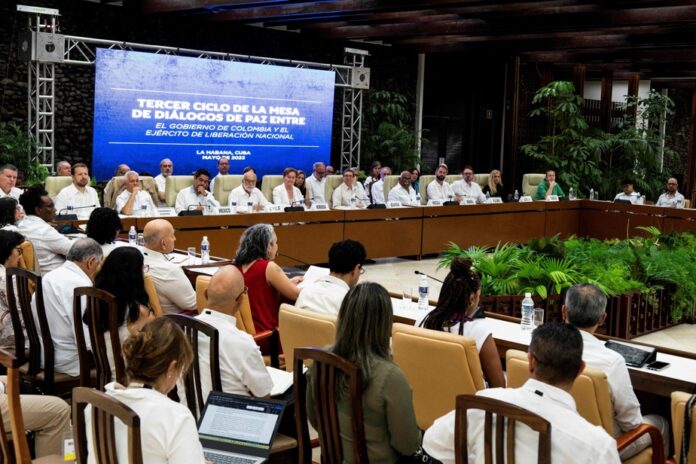(Havana) The Colombian government and the National Liberation Army (ELN) guerrillas on Tuesday reaffirmed their desire to reach a ceasefire, agreeing on the need for society to participate in the peace process, at the start of a third round of negotiations in Havana.
“We have a huge responsibility to find together a way out of this despicable war,” said Colombian Senator Maria José Pizarro, a member of the government delegation present in Cuba to continue peace talks with the far-left guerrillas.
“The best way to contribute to the search for solutions to the armed conflict is to end this cycle with a society participation agreement, the construction of peace with the National Liberation Army and a ceasefire agreement, whose fundamental axis must be that the people do not suffer, “added the senator.
The two delegations are resuming dialogue as part of the peace process initiated at the end of 2022 by the left-wing president, Gustavo Petro. Talks began in November in Caracas before continuing in March in Mexico City where the two sides pledged to discuss a ceasefire.
“We are determined to achieve the objectives that we set ourselves during the Mexico cycle, namely a ceasefire and the participation of society” in the peace process, said Pablo Beltran, head of the delegation of the ELN, the last constituted guerrilla still active in Colombia.
“The marginalized and exploited sectors cannot be mere spectators in this process,” he insisted.
In Madrid, President Petro, the first left-wing president in the country’s history, recalled that “peace processes must always achieve a ceasefire, otherwise it makes no sense to talk about peace”. . He also proposed to “regionalize ceasefires that could gradually be extended to national geography.”
According to government negotiator Otty Patiño, Bogota hopes to reach a ceasefire before regional elections in October. “The idea is to conclude a temporary ceasefire, which is deep, so that it is irreversible,” he told reporters.
Despite the commitments made in Mexico, the death of nine Colombian soldiers on March 29, killed in an ELN ambush, had raised doubts about the continuation of the conversations.
Bloodied by half a century of armed conflict, Colombia has attempted numerous peace negotiations with armed groups, without always succeeding.
In 2016, however, a historic agreement led to the disarmament of the powerful guerrillas of the Revolutionary Armed Forces of Colombia (FARC) and its transformation into a political party.
The ELN delegation left Havana in September 2022, where it had been since 2018 when talks began with the government of Juan Manuel Santos (2010-2018).
His successor Ivan Duque (2018-2022) ended negotiations in 2019 after a deadly attack on a police school in Bogota. The Colombian president then reactivated the arrest warrants against the armed group’s negotiators and asked Cuba for their extradition, which Havana refused.
This refusal prompted US President Donald Trump to put Cuba on the blacklist of countries supporting terrorism.
On Tuesday, Senator Maria José Pizarro said that the “best tribute” that could be paid to the communist island would be to achieve an “absolutely irreversible peace process and that the result allows Cuba to be removed from this list as soon as possible. harmful”.


















